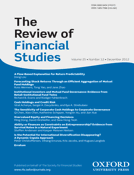
REVIEW OF FINANCIAL STUDIES
Scope & Guideline
Pioneering Research in Accounting and Finance
Introduction
Aims and Scopes
- Empirical Finance:
The journal emphasizes empirical studies that analyze financial markets, instruments, and behaviors, employing robust statistical techniques to derive insights from real-world data. - Behavioral Finance:
Research exploring the psychological factors influencing investor behavior and decision-making processes is a significant focus area, contributing to a deeper understanding of market dynamics. - Corporate Finance:
The journal publishes research on corporate financial policies, governance, capital structure, and the implications of financial decisions on firm performance. - Monetary Economics and Policy:
It encompasses studies on the effects of monetary policy on financial markets and the economy, including the role of central banks and regulatory frameworks. - Financial Technology and Innovation:
The journal is open to research on technological advancements in finance, including fintech, blockchain, and machine learning applications, reflecting the evolving landscape of the financial sector. - Risk Management and Financial Stability:
Research on systemic risk, market stability, and risk management practices is a core area, addressing critical issues faced by financial institutions.
Trending and Emerging
- Impact of Climate Change on Finance:
Recent publications increasingly address the intersection of climate change and finance, exploring how environmental factors influence investment strategies, risk assessments, and corporate policies. - Machine Learning and Big Data in Finance:
There is a surge in research utilizing machine learning and big data analytics to enhance financial modeling, forecasting, and investment strategies, indicating a strong trend towards data-driven finance. - Diversity and Inclusion in Finance:
Emerging studies focus on the implications of gender and racial diversity within financial institutions, examining how diversity impacts decision-making, corporate governance, and financial performance. - Digital Finance and Cryptocurrencies:
Research on digital currencies, blockchain technology, and their implications for traditional finance is gaining momentum, reflecting the transformative impact of these innovations on the financial landscape. - Behavioral Insights into Financial Decision-Making:
There is a growing emphasis on understanding behavioral biases and their effects on investment choices, market behavior, and policy implications, highlighting the importance of psychological factors in finance.
Declining or Waning
- Traditional Asset Pricing Models:
There is a noticeable decrease in studies centered on classical asset pricing models, as the field moves towards more complex and adaptive models that incorporate behavioral and market dynamics. - Static Risk Assessment Models:
Research that relies solely on static risk assessment models is waning, with a growing preference for dynamic models that account for changing market conditions and investor behavior. - Conventional Banking Practices:
Studies focusing on traditional banking practices are less frequent, as the rise of fintech and alternative finance models captures more attention. - Historical Financial Events Analysis:
While historical analysis remains important, the focus on specific past financial crises is diminishing in favor of forward-looking research that addresses current and future financial challenges.
Similar Journals
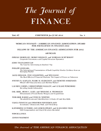
JOURNAL OF FINANCE
Advancing financial knowledge since 1946.JOURNAL OF FINANCE, published by Wiley, stands as a premier academic journal in the fields of finance, economics, and accounting. With a history dating back to 1946, the journal has consistently delivered impactful research that shapes financial theory and practice, boasting an impressive impact factor reflective of its high citation rate. Its Quartile 1 ranking in Accounting, Economics and Econometrics, and Finance illustrates its leading position within these disciplines. Although not an open access publication, the journal continues to be indispensable for researchers, professionals, and students seeking to advance their understanding and knowledge through rigorous empirical analysis and comprehensive reviews. With an esteemed global readership, the JOURNAL OF FINANCE remains committed to fostering the dissemination of innovative financial research well into 2024 and beyond.

Journal of Multinational Financial Management
Advancing Knowledge in Multinational Financial ManagementThe Journal of Multinational Financial Management, published by Elsevier, stands at the forefront of research in the fields of economics and finance, with a notable impact factor that underscores its significance in both academia and industry. With an ISSN of 1042-444X and E-ISSN of 1873-1309, this esteemed journal operates out of the Netherlands, specifically from its address at RADARWEG 29, 1043 NX AMSTERDAM. It has earned commendable rankings, including Q2 in Economics and Econometrics and Q1 in Finance for 2023, solidifying its reputation as a vital resource for researchers, professionals, and students interested in global financial management and the intricate dynamics of multinational corporations. Covering a wide scope of relevant topics from 1997 to 2024, the journal strives to foster advancements in financial theories and practices. While currently not an open access journal, it remains a critical repository for scholars aiming to explore and publish their work within a peer-reviewed platform that continues to make substantial contributions to the discipline.
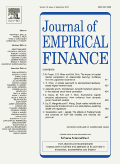
Journal of Empirical Finance
Empowering finance through rigorous empirical research.Journal of Empirical Finance, published by Elsevier, stands as a key resource in the areas of finance and economics, with a definitive focus on empirical studies. As a prominent journal since its inception in 1993, it has made significant strides in contributing to the academic community, evidenced by its soaring categorization in Q1 for Finance and Q2 for Economics and Econometrics as of 2023. With an ISSN of 0927-5398 and an E-ISSN of 1879-1727, the journal emphasizes robust, data-driven analysis to inform both theoretical and practical aspects of financial research. While access options do not include open access, the journal ensures that its content remains accessible to a diverse audience of researchers, professionals, and students. It fosters a platform for innovative research and discourse, significantly impacting the fields of finance, economics, and econometrics. The Scopus rankings further bolster its reputation, placing it in the 61st percentile in both categories, reflecting a commitment to high-quality research output. As the journal continues to evolve, it invites contributions that push the boundaries of empirical finance, enabling a deeper understanding of financial mechanisms that drive global economies.
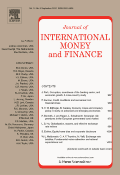
JOURNAL OF INTERNATIONAL MONEY AND FINANCE
Shaping the future of economics and finance research.JOURNAL OF INTERNATIONAL MONEY AND FINANCE is a premier scholarly publication dedicated to advancing the understanding of international finance and monetary economics. Published by Elsevier Science Ltd, this esteemed journal has been disseminating critical research since its inception in 1982 and will continue to contribute to the field through 2024. With a strong international presence and headquarters in the United Kingdom, the journal boasts an impressive collection of articles that explore significant trends, challenges, and innovations in the areas of economics and finance. Recognized for its impact, it ranks in the top quartile (Q1) in both the Economics and Econometrics and Finance categories as of 2023, signifying its influence and relevance among peers. Researchers, professionals, and students in these disciplines can benefit from the journal's rigorous peer-review process, ensuring high-quality scholarly outputs. Though not currently an open-access journal, it provides various subscription options to foster access to groundbreaking research in the financial ecosystem.
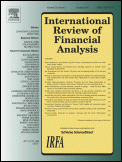
International Review of Financial Analysis
Elevating discourse with cutting-edge financial insights.The International Review of Financial Analysis, published by Elsevier Science Inc, is a premier journal dedicated to advancing the fields of finance and economics. With an impressive impact factor and ranked in the top quartile (Q1) of both Economics and Econometrics and Finance categories, this journal is recognized for its high-quality research and significant contributions to the discipline. Since its inception in 1992, it has provided a platform for scholars to present innovative theories and empirical studies that address critical financial issues around the globe, making it a vital resource for researchers, professionals, and students alike. Although it does not offer open access, the journal actively engages with contemporary debates in financial analysis, ultimately empowering its readership to contribute to and benefit from the ongoing discourse. With its convergence of financial research and analytical methodologies through 2024, the International Review of Financial Analysis remains a cornerstone in the pursuit of knowledge within the ever-evolving landscape of finance.
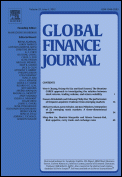
Global Finance Journal
Connecting theory with practice in finance.Global Finance Journal is an esteemed periodical published by Elsevier, dedicated to the dynamic fields of finance and economics. With an impressive history spanning from 1989 to 2024, this journal holds a significant position in the academic community, boasting a Q1 quartile ranking in both Economics and Econometrics, as well as Finance, as of 2023. It is highly regarded in Scopus rankings, placing 40th out of 317 in Finance and 99th out of 716 in Economics and Econometrics, demonstrating its influence and reach among researchers and practitioners alike. Although not an open-access journal, the Global Finance Journal provides rigorous peer-reviewed articles that explore critical issues, advance theoretical frameworks, and address practical applications in global finance. As such, it serves as a vital resource for researchers, financial professionals, and students aiming to deepen their understanding of economic phenomena and contribute to the ongoing discourse in these vibrant disciplines.
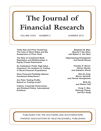
JOURNAL OF FINANCIAL RESEARCH
Advancing Knowledge in Finance and AccountingThe JOURNAL OF FINANCIAL RESEARCH, published by WILEY, stands as a pivotal platform for disseminating innovative research in the fields of finance and accounting since its inception in 1978. With an ISSN of 0270-2592 and an E-ISSN of 1475-6803, this journal aims to address contemporary challenges and trends within the financial research landscape. It has achieved notable recognition, being placed in the Q2 category for both Finance and Accounting in the 2023 rankings, signifying its relevance and impact within the academic community. Although it does not currently offer open access, the journal is accessible through various academic databases, catering to a diverse audience of researchers, professionals, and students keen on advancing their knowledge and understanding of financial systems and methodologies. With an evolving scope that encompasses empirical studies, theoretical frameworks, and practical applications, the JOURNAL OF FINANCIAL RESEARCH is committed to contributing valuable insights into the complexities of financial practices and policies.

International Journal of Managerial Finance
Connecting academia and practice in the world of finance.The International Journal of Managerial Finance is a leading academic journal published by Emerald Group Publishing Ltd, dedicated to advancing the field of finance through rigorous research and scholarly discourse. Its ISSN is 1743-9132, with an E-ISSN of 1758-6569. Since its inception in 2005, the journal has provided valuable insights and frameworks that bridge theory and practice in managerial finance, making it an essential resource for researchers, professionals, and students alike. With its current standing at Q2 in both Business, Management and Accounting and Finance categories for 2023, and impressive Scopus ranks that place it in the 70th and 68th percentiles respectively, the journal is recognized for its high-quality contributions to the field. Though it does not currently offer open access, the rigorous selection process ensures that published articles are of the highest academic standard, providing a platform for significant discussions around contemporary issues in finance and management. The International Journal of Managerial Finance continues to play a pivotal role in shaping the discourse within the financial sector, fostering knowledge that is instrumental for effective managerial decision-making.
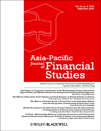
Asia-Pacific Journal of Financial Studies
Pioneering Financial Discourse in the Asia-Pacific LandscapeAsia-Pacific Journal of Financial Studies is a premier academic journal published by WILEY, dedicated to advancing the field of finance within the dynamic Asia-Pacific region. With an ISSN of 2041-9945 and an E-ISSN of 2041-6156, this journal stands out for its rigorous peer-reviewed research spanning various topics in finance, making it a vital resource for researchers, practitioners, and students alike. It has achieved an impressive Q2 ranking in Finance as of 2023, placing it within the top half of finance journals as measured by its relevance and quality of contributions in the Scopus Economics, Econometrics and Finance category. Additionally, the journal supports researchers with robust access options, promoting broader dissemination of knowledge. Its dedicated focus from 2006 to 2024 highlights the journal's commitment to continuous scholarly exchange and innovation in financial studies. As it thrives in the competitive landscape of scholarly publishing, the Asia-Pacific Journal of Financial Studies not only enriches academic discourse but also informs practices that shape financial markets and policies in the region.

China Finance Review International
Bridging Theory and Practice in Chinese FinanceChina Finance Review International (ISSN: 2044-1398; E-ISSN: 2044-1401) is an esteemed journal published by Emerald Group Publishing Ltd, located in the United Kingdom. With a commendable Q1 ranking in the field of finance according to 2023 category quartiles, this journal has established itself as a leading platform for disseminating significant research in the realms of economics, econometrics, and finance, boasting a remarkable Scopus rank of #13 out of 317, placing it in the 96th percentile. The journal focuses on advancing the discourse surrounding financial issues related to China, making it essential reading for academics, professionals, and students eager to explore the dynamic shifts in this critical area of global finance. As it continues to bridge theoretical insights with practical applications, the China Finance Review International aims to foster a comprehensive understanding of financial mechanisms at play within one of the world's most impactful economies.